'Maybe 10 percent of the players are earning what they're supposed to earn'

From his home in Seattle far in the northwest of America, Waisale Serevi watched Fiji’s joyous autumn conquering of France, his heart exploding with pride.
Against all the odds, battling a gross financial disparity, meagre preparation time, tackling a Tier One heavyweight on their own patch, his boys did it.
Theirs is a cruel dilemma. The Pacific Islands spawn the most incredible raw talent but haven’t the resources to harvest the gold on their doorstep or safeguard it from exploitation.
Serevi is probably Fiji’s most storied export, his exhilarating feats across two decades traversing the world as a sevens galactico etched into rugby lore.
“We’ve shown the world what can happen,” he says. “We’ve beaten France, it’s history for us and a stepping stone, even though France is not doing well in international rugby.
“It’s a platform for us to go to the World Cup knowing that we can win at that level if we stay to the structure, the discipline and the patience.
“Individually we are maybe a little bit better than some other players in the world. One-on-one a Fijian player can beat our opposition. Our forwards are faster and skilful; our backs are faster and stronger. But to be the best, you need to attack and defend as a team and have very good structure.
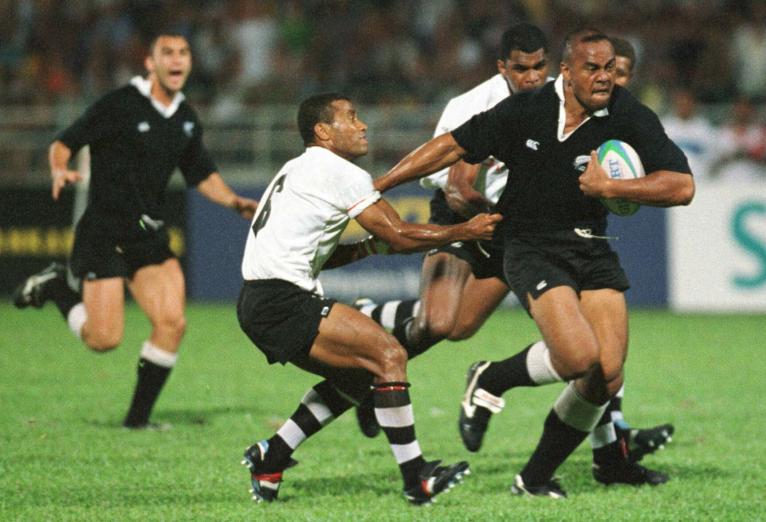
“The only thing that separates the best teams in the world is patience and discipline. The top teams are creating 15 phases to score tries or get three points. From my point of view, definitely, we need to play a lot of Tier One nations and compete on that level so that we can be competitive and had the opportunity.”
Many of Fiji’s current squad play their club rugby in Europe. In the earliest days of professionalism, Serevi spent time in Japan, at Leicester Tigers and with several teams in France. That stint at Welford Road was eye-opening, a window into the world of the burgeoning elite and the ferocity with which they went about their business.
“In the islands, you try and make fun at training – it’s not that serious until you go on to the field. In professional rugby, you need to be punctual, you eat together, live together as a team,” Serevi says.
“You have to train like you play. The training is very competitive. I played with all those great players – Neil Back, Martin Johnson, Will Greenwood, Joel Stransky, Austin Healey – all those guys compete.
“When we train and do attack-defence, sometimes there’s a big fight, especially when Austin Healey is there!
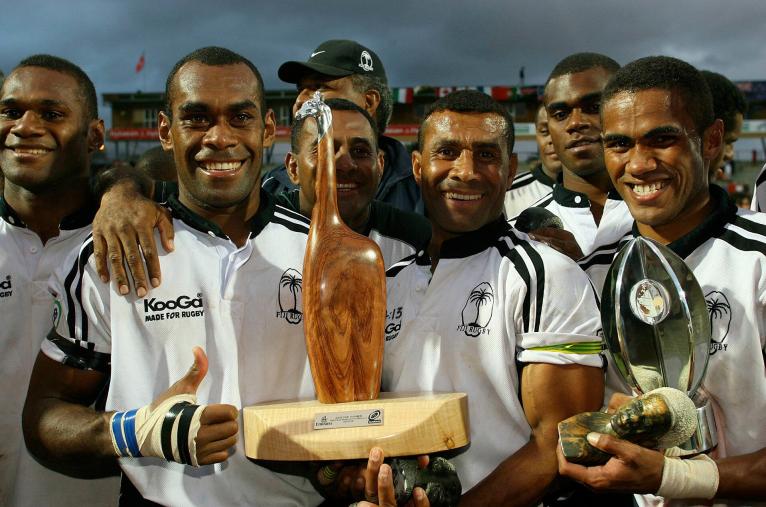
“When the island boys experience that professional set-up, they become a better rugby player and a better person. They know what is good and bad and when they go back to their country, they share it with their team.”
You can reel off a long list of Fiji-born professionals who have taken the opportunity to represent their adopted nations after serving three years of residency. Taqele Naiyaravoro, Henry Speight and Marika Koroibete are all Wallabies. Virimi Vakatawa and Noa Nakaitaci play for France, Nathan Hughes for England, Samuela Vunisa for Italy and Waisake Naholo, who moved to New Zealand in his late teens, is now a World Cup-winning All Black.
“No matter how we change the laws in international rugby, it comes down to financial gain for these lads,” Serevi says.
“The Fiji, Tonga and Samoa Rugby Unions definitely cannot look after the players. I support and congratulate them. There is an opportunity for them to support their families.
“The only thing that I ask for these teams, Australia, New Zealand, that have a lot of Pacific Islands players with them, the least they can do is try and support the island teams by playing Tests against them. That is the only way that we can gain from losing our players.
“A lot of our players are scattered all over the world, it is always difficult to bring people together. The boys came together like five days before losing to Scotland – playing a Test match in five days is really hard.
“I always watch our team celebrate winning against Tonga and Samoa. That is not the one. We need to go up and beat New Zealand, Australia, South Africa – then we celebrate.”
Serevi wants overseas clubs to manage their Pacific incomers carefully, be cognisant of their culture and the challenges of swapping island life for a western city. Generally, European teams are getting better at this, and the Pacific Rugby Players Welfare group put in a power of work to look after the vulnerable.
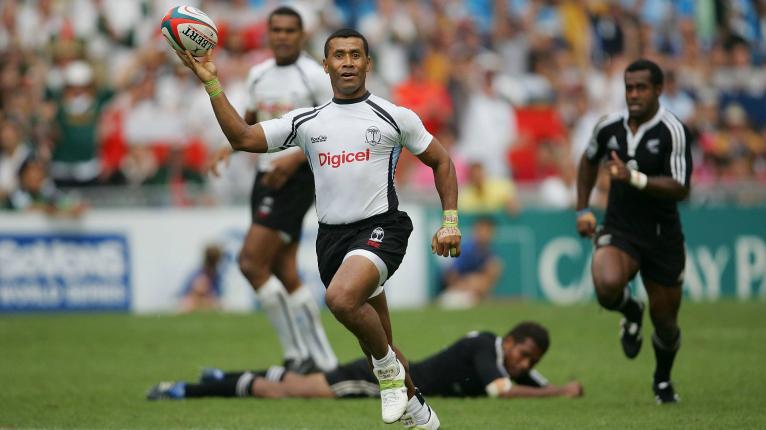
In Scotland, for instance, Viliame “Big Bill” Mata has emerged as one of the best number eights in the world, thanks in part to the way Edinburgh have helped him and his family adjust to the bustle, the climate and the way of life.
“They’re not paid a lot of money but these players are very good. They play better than people who get paid more than them. Maybe 10% of the players are earning what they’re supposed to earn,” Serevi believes.
“They play their hearts out, they play really good rugby, and they bring fans over to watch because of the way they play. These clubs must look after the players. Talk to them and ask questions and try and help them.
“The islanders are very good players but for us, saying no is difficult, even though we are facing difficulties. It’s like a cultural thing for us, the respect is always there.
“If they’re supposed to get something and they’re not getting it, they keep quiet. A lot of people ask the question, ‘are you ok?’ They always say, ‘yes, we are ok’.
“People at home are relying on them, the whole community is thinking they are getting millions of dollars and they are struggling even to support their families.”
Serevi lived that life and felt those pressures. Eventually, when he was sacked as Fiji Sevens head coach nearly a decade ago, they took their toll.
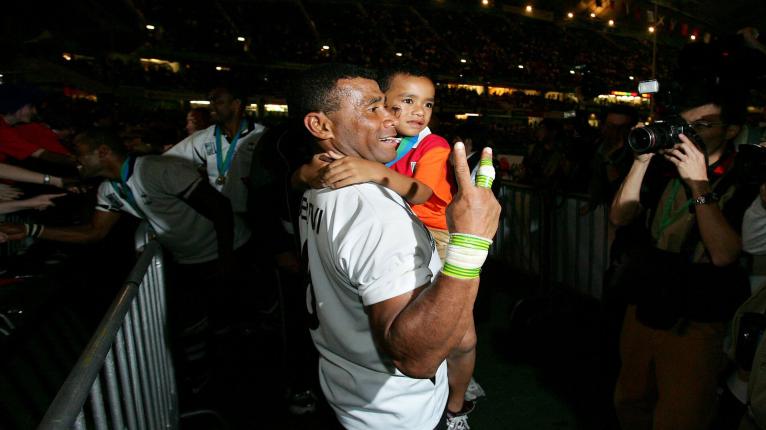
In a book published earlier this year that charts his rugby voyage, Serevi is depicted as penniless, depressed and addicted to alcohol. At the end of a wonderful career, the little maestro was on his knees. The book says his troubles stemmed from financial mismanagement, low wages during his playing days and his own generosity, sending money and barrow-loads of rugby kit back to his community, before a tax audit gobbled up what little he had saved.
“That one year that was my low time, I kept saying to myself, I did great things for 21 years at international level, this is just a test,” Serevi recalls.
“I need to get up and keep going and stay positive and try and support my family. At one stage, I was hearing thousands of people at the stadium cheering for me. And now, when I was at my low time, the thing that motivated me was my family – I can hear four voices, my wife and my three kids, cheering me and saying, you can do better, keep going. That kept motivating me and I thank god for the door that opened. We are blessed we are here.”
“The door that opened” came in the form of a trip to Canada, where Serevi had been asked to play for a Fijian invitational team. There, he would meet his business partner-to be, and with great help from those in Seattle rugby, was able to forge a new life coaching in America.
His company, now called Atavus Rugby, blossomed. He worked to introduce rugby-style tackling to the Seattle Seahawks, who won the 2013 Super Bowl and became renowned for their defensive menace.
Now, a new challenge beckons. Serevi is a sevens head coach again. He was placed in charge of Russia in October, his goal to lead them back to the World Series and into the Tokyo 2020 Olympic Games. In his first tournament at the helm, Russia finished fourth in the second-tier Dubai International Invitational event. Serevi wants to immerse himself in Russian life and scour the country for talent.
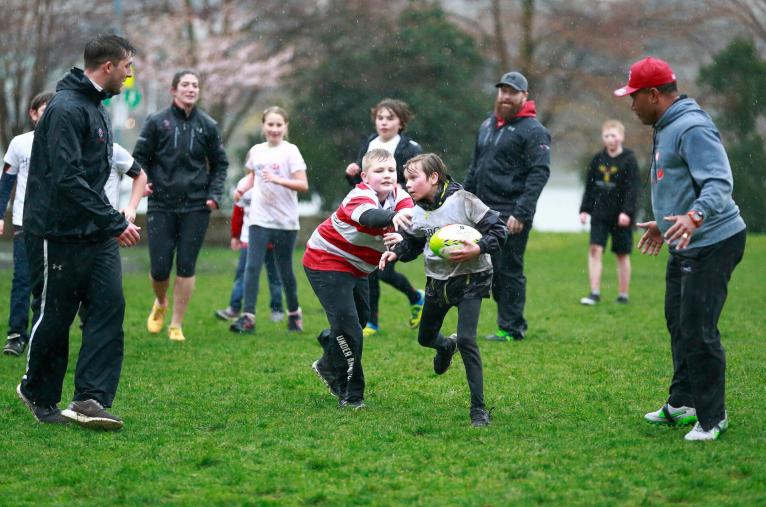
“With new things, new attacking and defensive structure, a lot of decision-making, I thought the boys did well,” Serevi says.
“I was excited and watching the video for the last couple of days and I know what we can get better at for the next tournaments in Uruguay and Chile in January.
“The players we have now are the players they already selected because they were short of time. I would love to go around and watch XVs rugby games, watch the Russian sevens tournament that is starting soon. I want to be out there scouting for talent because that’s what I am good at.
“As soon as I see players I know whether they can survive. That’s what I saw when we went to Dubai. Some players can perform at club sevens, the next level up is the invitational international sevens. Even in Dubai, I saw some that can’t go to the next level – they can’t even compete at this level.
“That’s the main reason I wanted to go out and hunt for untapped talent, so that we have good depth.”







































Comments on RugbyPass
Oh wow… “But as La Rochelle proved in winning in Cape Town this season, a cross-continental away assignment need not spell the end of days.” La Rochelle actually proved quite the opposite. After traveling to Cape town and back they (back-to-back and current champs) got mercilessly thumped the next week. If travel is not the reason, why else would a full-strength powerhouse like La Rochelle get dumped on their @r$e$ one week later?
26 Go to commentsYou know he can land a winning conversion after the full time siren is up. (Even if it takes two attempts.)
5 Go to commentsA very insightful article from Jake. I would love to know how South African’s feel about their move to Europe. Do you prefer playing in Europe or want to go back to Super Rugby?
2 Go to commentspure fire
1 Go to commentsA very well thought out summary of all the relevant complications…agree with your ”refer the Cricket Test versus 20/20 comparison”. More also definitely doesn't necessarily mean better!
2 Go to commentsMust be something when you are only 19 y.o and both NZ and France want you. Btw he wasn’t the only new caledonian in french U20 as Robin Couly also lived in Noumea until 17. Hope he’s successful wherever he chooses to play.
7 Go to comments“Several key players in the Stade Rochelais squad are in their thirties” South Africans are going to hate the implications of that comment!
5 Go to commentsI know Leinster did a job on La Roche but shortly after HT Leinster were 30-13 ahead of them and at a similar time Toulouse were trailing Exeter. At 60 mins Leinster were 27 ahead but after 67 mins Toulouse were only 19 ahead before Exeter collapsed. That’s heavier scoring by Leinster against the Champions. I think people are looking at Toulouses total a little too much. I also think Northhampton are in with a real chance, albeit I’d put Leinster as favourites. If Leinster make the final I expect them to win by more than ten and with control.
5 Go to commentsHey Nick, your match analysis is decent but the top and tail not so much, a bit more random. For a start there’s a seismic difference in regenerating any club side over a test team. EJ pretty much had to urinate with the appendage he’d been given at test level whereas club success is impacted hugely by the budget. Look no further than Boudjellal’s Toulon project for a perfect example. The set ups at La Rochelle and Leinster are like chalk and cheese and you are correct that Leinster are ahead. Leinster are not just slightly ahead though, they are light years ahead on their plans, with the next gen champions cup team already blooded, seasoned and developing at speed from their time manning the fort in the URC while the cream play CC and tests. They have engineered a strong talent conveyor belt into their system, supported by private money funnelled into a couple of Leinster private schools. The really smart move from Leinster and the IRFU however is maximising the Irish Revenue tax breaks (tax relief on the best 10 years earnings refunded at retirement) to help keep all of their stars in Ireland and happy, while simultaneously funding marquee players consistently. And of course Barrett is the latest example. But in no way is he a “replacement for Henshaw”, he’s only there for one season!!! As for Rob Baxter, the best advice you can give him is to start lobbying Parliament and HMRC for a similar state subsidy, but don’t hold your breath… One thing Cullen has been very smart with is his coaching team. Very quickly he realised his need to supplement his skills, there was talk of him exiting after his first couple of years but he was extremely shrewd bringing in Lancaster and now Nienaber. That has worked superbly and added a layer that really has made a tangible difference. Apart from that you were bang on the money… 😉😂
5 Go to commentsNot sure exactly what went wrong for him at Glasgow but it’s pretty clear he ain’t Franco’s cup of tea. Suspect he would have been better served heading out of Scotland around the same time as Finn, Hoggy and Jonny!
1 Go to commentsBulls disrespected the Northampton supporters and the competition. Decide quickly, fully in or out.
26 Go to commentsI wonder if Parling was ever on England’s radar as a coach? Obviously Borthwick is a great lineout coach, but I do worry he might be taking on too much as both head coach and forwards coach.
1 Go to commentsJason Jenkins has one cap. When Etzebeth was his age he had over 80 caps. Experience matters. He will never amount to what Etzebeth has because he hasn’t been developed as an international player.
2 Go to commentsSays much about the player picking this gig over the easier and bigger rewards offered to him in Japan. Also says a lot about the state sanctioned tax benefits the Irish Revenue offers pro rugby players, with their ten highest earning years subject to an additional 40% tax relief and paid as a lump sum, in cash, at retirement. Certainly helps Leinster line up the financial ducks in a row to fund marquee signings like this!!! No other union anywhere in world rugby benefits from this kind of lucrative financial sponsorship from their government…
5 Go to commentsTrue Jordie could earn a lot more in Japan. But by choosing Leinster he’ll be playing with 1 of the best clubs in the world and can win a champions cup and URC…..
6 Go to commentsThanks for that Marshy, noticed you didn't say who is gonna win it. We know who ain't gonna win it - your Crusaders outfit. They've gone from having arguably the best Super Rugby first five ever, to having a clutch of rookies. Hurricanes all the way!
1 Go to commentsGeez you really have to question the NRLs ability to produce players of quality. Its pathetic. Dont the 25mil in Aus produce enough quality womens players. Sad.
1 Go to commentsBulls fan here, and agree 100% with the conclusion (and little else) of this article. SA sides should absolutely f-off from the champs cup until we get fair scheduling, equal support for travel arrangements and home semis. You know, like all the european teams get.
26 Go to commentsI’m yet to see why Grace would be an ABs contender. He’s pedestrian and lacks the dominance required of a top flight 8.
11 Go to commentsGee my Highlanders were terrible. They have gone backwards since the start of the season. The trouble began when we left Millar behind to prep as the 10 against the Brumbies and he was disconnected from the team that came back from Aussie. We rested Patchell for that game and we blew an avalanche of ball in good attacking positions in the 1st half. Against the Rebels we seem to of gone into a pod system with forwards hanging off from the breakdown leaving Fakatava to secure our ball!
80 Go to comments